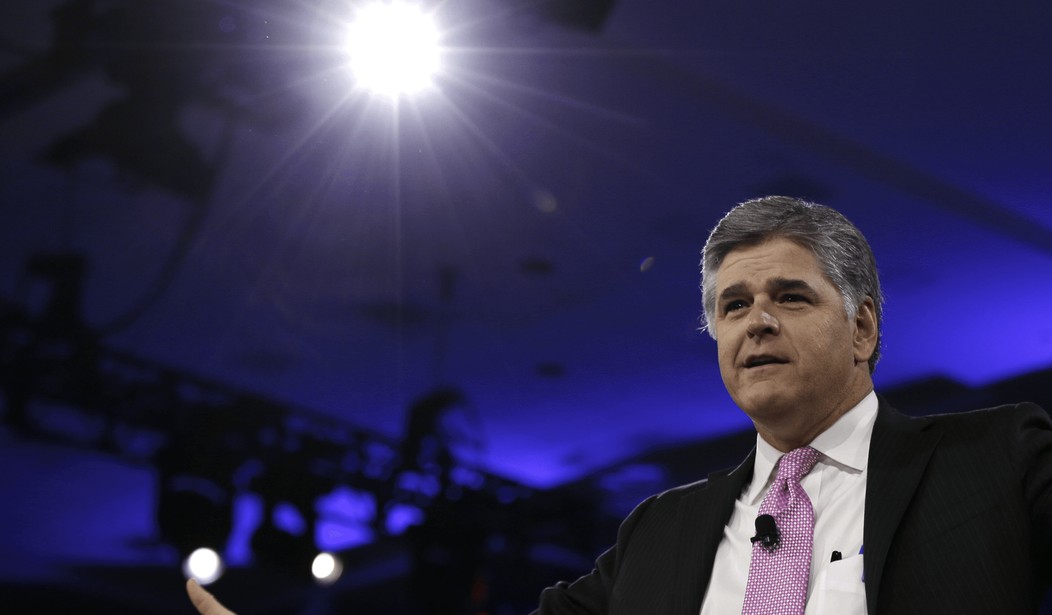An online dust-up between Fox News stalwart Sean Hannity and Wall Street Journal foreign affairs columnist Bret Stephens could pretty well serve as a Punch cartoon illustrating the current division of the Republican Party. Stephens — an elite boarding school boy and ferocious Never Trumper — and Hannity — a man-of-the-people type so far in the tank for Trump it’s hard to find the top of his head — went at each other on Twitter full force. Stephens called Hannity “Fox News’s dumbest anchor” and Hannity called Stephens an “arrogant, elitist… a-hole.” So that’s pretty clear.
All this started, as far as I can tell, when Hannity pulled a Trumpian tantrum of sorts on his radio show, saying, “If in 96 days, Trump loses this election, I am pointing the finger directly at people like Paul Ryan and Mitch McConnell and Lindsey Graham and John McCain,” who refused to give Trump full support. Hence the “dumbest anchor” gybe from Stephens, who thinks Trump is an unacceptable and dangerous proto-fascist.
I’ve always found a lot to admire in both Hannity and Stephens. Sean’s just the kind of top-notch broadcaster the right needs to get its message across. Stephens is an excellent and moral observer of foreign affairs. I agree with Hannity that the elites and the elected did not do enough to stop the Obama agenda. I agree with Stephens that Trump is a serious bad news dude. (Though I think Hillary is at least as bad, a discussion for another day).
But as these two men do seem to represent two warring sides of the Republican Party, I’d like to point out, with respect, where I think both of them have gone wrong along the way.
Back in 2012, Hannity tweeted this message to the floundering GOP: “Time 2 start nominating disciplined, principled conservatives; men & women who will defeat their opponents, not themselves.” In throwing his support unreservedly behind Trump, Hannity ignored every part of that advice, including the commas. If the heart of conservative principle is the idea that government should be as limited as possible to insure the freedom of the individual, Trump is not any kind of a conservative. He has touted universal health care, eminent domain, and strong-man government (“I alone can solve!”). And it has been painful to watch Sean putting conservative words into Trump’s mouth during interviews while Trump nods without an iota of understanding in his eyes. As for a candidate defeating himself, Trump seems a master of the craft.
But leaving out the obscenities, Bret Stephens has, in fact, come across as an arrogant elitist from time to time. His support of illegal immigration and gay marriage frequently drips with disdain for his opponents. No matter where you stand on those issues, it is not so hard to comprehend the rage people feel at having their country’s laws broken and their age-old traditions undemocratically tossed aside as if those who govern us have hit upon some new moral understanding that transcends law and tradition both. (Spoiler Alert: They haven’t.) A little understanding of the people — a little respect for the people — a little bit of outreach to the anxieties of the people — not just from Stephens but from the entire WSJ editorial staff and their ilk — would have gone a long way toward staving off the rise of Trump.
As I’ve said repeatedly, I’ve already lost this election. There can be no good outcome for me; no outcome, I mean, that results in the rollback of government intrusion in our lives or of Washington’s profligate spending of my children’s earnings and their children’s earnings. I am already experiencing all the natural human reactions to such a loss: sorrow, anger and a search for reasons. In the feud between Hannity and Stephens, I see at least one of those reasons writ large: the rift in our party between the people and the elites and their mutual failure to heed each other’s warnings and listen to each other’s concerns.
For more commentary, listen to my podcast Monday through Thursday.









Join the conversation as a VIP Member